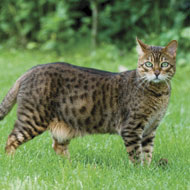Kitten farm fears after pedigrees abandoned

Yorkshire Cat Rescue became suspicious when three pregnant pedigree cats were abandoned (file photo).
Kitten farmers are thought to be responsible for a spate of pedigree cat abandonments in Yorkshire. A cat charity in the area is warning potential buyers to be vigilant.
Suspicions were aroused after two pregnant Bengal cats and one pregnant Persian were all taken in by cat rescue centres in the area at around the same time.
"Bengal kittens sell for hundreds of pounds and are usually treasured by their owners," said Sara Atkinson, founder of Yorkshire Cat Rescue. "So we were immediately suspicious when no one came forward to claim Kiki despite all our efforts to find her owner.
"When we heard about the other stray pedigree cats, we immediately thought something more sinister was up."
Bengal cat Kiki is estimated to be around eight years old and Yorkshire Cat Rescue believe she has been intensively bred from a young age.
Sara said: "Her teeth are in an appalling condition and she had very little body fat when we found her".
It is suspected that Kiki and the other two cats were abandoned by back street breeders when they became too old to repeatedly produce litters.
Kiki gave birth in a foster home but sadly three of her kittens died within a week and the final two died eight weeks later despite the best efforts of charity staff and foster carers to hand rear them when their mother's milk dried up.
"Our worry at this point is for any remaining cats that may still be used for intensive breeding, and for others that have been thrown out and are living on the streets," Sara explained.
The charity urges those who want a pet cat to consider a rescue, or if they do decide to buy, choose a responsible breeder that is registered with the Governing Council of the Cat Fancy and provides full and proper papers for their pedigree kittens.
"I sincerely hope that Kiki's story will highlight the perils of buying kittens - or indeed any animal - without making sure the mum is first and foremost a happy and healthy pet," Sara added.



 The Veterinary Medicines Directorate (VMD) is inviting applications from veterinary students to attend a one-week extramural studies (EMS) placement in July 2026.
The Veterinary Medicines Directorate (VMD) is inviting applications from veterinary students to attend a one-week extramural studies (EMS) placement in July 2026.